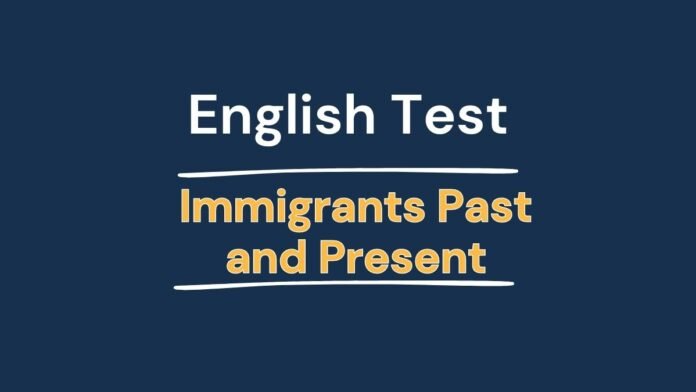“English Test – Immigrants Past and Present” will test your knowledge of English, including Reading, Grammar, Functions, and Writing.
——————–
If we go back far enough, we can say that everyone who lives in Britain today has origins somewhere else. Many of us can probably trace the immigrants in our family histories. Some may have been among the various invading armies – Roman, Saxon, Viking, or Norman. Others had little choice about coming: Africans were brought to Britain by force in the seventeenth and eighteenth centuries as slaves or servants. And thousands of people arrived at various times as refugees from France, Ireland, Russia, and other countries, escaping from persecution or famine in their own countries.
Most people probably came because they thought they could make a better life for themselves here. Before 1914, when the First World War broke out, there were fewer restrictions, and it was possible to travel to many countries without passports, visas, or work permits. People could just decide to make a new life somewhere else, provided they had enough money for the passage. Often they were encouraged by the monarch or government because immigration was a way of dealing with local shortages of capital, skills, or labor.
At any one time, newcomers have only been a tiny proportion of the British population. Even today, only about 7% of the population was not born in Britain. Newcomers have often met hostility, hatred, and resentment, yet even a quick study would show that they have brought skills and qualifications, set up businesses, and created jobs, not only for themselves but also for local people. Many have been willing to do jobs that have been difficult to fill locally. What is remarkable and often not understood is that the contributions immigrants and their immediate descendants have made, and continue to make, to Britain are out of all proportion to their numbers.
I. COMPREHENSION (6 pts)
A. ARE THESE SENTENCES TRUE OR FALSE? JUSTIFY. (2pts)
- Immigrants needed visas, passports, and a lot of money to pass to Britain.
- Immigrants were unskilled and not well qualified.
B. ANSWER THE FOLLOWING QUESTIONS. (3pts)
- According to the text, why did immigrants go to Britain?
- How did British people treat the newcomers?
C. THE LAST SENTENCE OF THE THIRD PARAGRAPH MEANS (1pt)
- What immigrants have done for Britain is much greater than their numbers.
- What immigrants have done for Britain is as great as their numbers.
- What immigrants have done for Britain is less great than their numbers.
II. LANGUAGE (7 pts)
A. MATCH THESE WORDS TO FORM COLLOCATION (2 pts)
- General
- Humanitarian
- Voluntary
- Civil.
a. society
b. assembly
c. work
d. aid
B. REWRITE THE FOLLOWING SENTENCES STARTING AS SUGGESTED (4 pts)
- Jobs were difficult. Jobs were taken by immigrants.
- The jobs …………..…………
- “It’s terribly hot today! Why don’t we go to the beach and have a swim?” said Brian.
- Brian said that ……………………….
- I am not old enough to drive a car.
- I wish ……………………
- My bicycle was broken; that’s why I didn’t go to school.
- If ………….…………
C. CHOOSE THE CORRECT OPTION TO COMPLETE THE SENTENCE. (1 pt)
- International organizations try hard to establish peace and welfare. ………………, local governments sometimes don’t cooperate.
- Besides – Although – However
- …………………….. an epidemic spread in some African countries, many NGOs sent medical assistance to the area.
- As a result – As soon as – Immediately
III. WRITING (7 pts)
Many people see that the situation of Moroccan women has known development in recent years. But some feminist activists claim that this change is only superficial and is not a real one.
Write an essay for your school magazine explaining if you agree or disagree with this claim
Key Answers to English Test – Immigrants Past and Present
I. COMPREHENSION (6 pts)
A. ARE THESE SENTENCES TRUE OR FALSE? JUSTIFY. (2pts)
- False. “Before 1914, when the First World War broke out, there were fewer restrictions, and it was possible to travel to many countries without passports, visas, or work permits.”
- False. “Quick study would show that they have brought skills and qualifications, set up businesses, and created jobs.”
B. ANSWER THE FOLLOWING QUESTIONS. (3pts)
- Immigrants went to Britain for various reasons, including the desire to make a better life for themselves, escape from persecution or famine in their own countries, and the opportunity to find work, skills, and qualifications. Some were encouraged to come by the monarch or government to address shortages of capital, skills, or labor.
- Newcomers often met hostility, hatred, and resentment from the British population.
C. THE LAST SENTENCE OF THE THIRD PARAGRAPH MEANS (1pt)
- What immigrants have done for Britain is much greater than their numbers.
II. LANGUAGE (7 pts)
A. MATCH THESE WORDS TO FORM COLLOCATION (2 pts)
I apologize for the confusion. Here are the correct matches:
- General assembly
- Humanitarian aid
- Voluntary work
- Civil Society
B. REWRITE THE FOLLOWING SENTENCES STARTING AS SUGGESTED (4 pts)
- The jobs that were difficult were taken by immigrants.
- Brian said that It was terribly hot today, and he suggested going to the beach and having a swim.
- I wish I were old enough to drive a car.
- If my bicycle hadn’t been broken, I would have gone to school.
C. CHOOSE THE CORRECT OPTION TO COMPLETE THE SENTENCE. (1 pt)
- However.
- As soon as.
